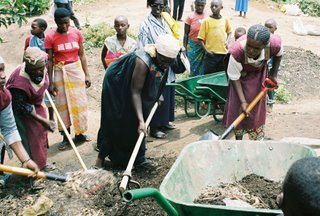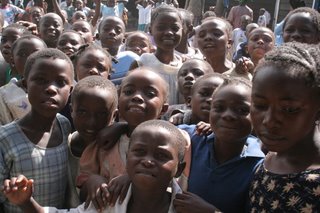"Dry Cleaning" Project in Rwanda
 One thing I learned in Africa was, things don't always mean what you think it means. Our staff said they would take us to the "dry cleaning" project. I immediately thought, hmmm, most people don't even have electricity, or enough money for food, how could they need a dry cleaner?Well to my surprise we drove up to a dump site. Widows and orphans collected rubbish, brought it to the dump site and then began the process of sorting out what they would burn and what they would recycle. This was the process of "drying" the burnable rubbish.. sorting was the process of "cleaning" it. The women and children worked hard everyday to make enough money to feed their families. I was so impressed by the hard working people of Rwanda.
One thing I learned in Africa was, things don't always mean what you think it means. Our staff said they would take us to the "dry cleaning" project. I immediately thought, hmmm, most people don't even have electricity, or enough money for food, how could they need a dry cleaner?Well to my surprise we drove up to a dump site. Widows and orphans collected rubbish, brought it to the dump site and then began the process of sorting out what they would burn and what they would recycle. This was the process of "drying" the burnable rubbish.. sorting was the process of "cleaning" it. The women and children worked hard everyday to make enough money to feed their families. I was so impressed by the hard working people of Rwanda.
Livestock Project in Rwanda
 The land grows the crop that feeds the livestock. Pigs, goats and chickens are breed onsite. And the eggs from the chickens pay for the workers who grow the crops and feed the animals.
The land grows the crop that feeds the livestock. Pigs, goats and chickens are breed onsite. And the eggs from the chickens pay for the workers who grow the crops and feed the animals.
A village is selected and approximately 20 HIV+ widows will receive one pig or goat. The women all live in the same village, and therefore will breed their animal with another widow’s animal. Once she has babies, she gives one back to ALARM and one to another widow in her village. After that she can sell her piglets or baby goats to get money to feed, clothe and provide school fees for her family.
Practical reconciliation also takes place as women from different tribes raise their livestock together.
Rwanda after Genocide
 In 1994 the world watched as over 800,000 men, women and children were brutally killed in Rwanda. As I drove down the streets of Rwanda in March of 2006, it was hard to imagine that these beautiful, peaceful people were at war with each other. It was hard to imagine that the streets were covered with slain bodies just 12 years before. All I could see were smiling faces of children as they ran up to our car, waving and saying, "Mazungu" (white person). The genocide left most churches without pastors, women without husbands and children without parents. The need is great. ALARM began working in Rwanda shortly after the genocide. So my time in Rwanda was spent visiting our many projects. Projects include Biblical training for pastors and women; skill training and assistance for widows and orphans. Many would ask, what was the breakdown in the church that believers would take up arms against another? Most pastors in Rwanda and all over Africa have very little if any biblical training. Many don't even have Bibles. If a believer doesn't know the word of God, how will they know not to kill their brothers and sisters in Christ? How will understand the forgiveness of God, and therefore how to forgive one another instead of revengeous? So ALARM is committed to training pastors and their wives. Some of the other projects to widows and orphans are: teaching women to sew, providing women and children with pigs, goats or chickens, so they can provide food and clothing for their families. And many other similar projects. They are geared to help the people help themselves instead of becoming dependant on agencies, UN or NGO's. It was so encouraging to see people from different (previously warring tribes) working together in the church, in the fields and in small business.
In 1994 the world watched as over 800,000 men, women and children were brutally killed in Rwanda. As I drove down the streets of Rwanda in March of 2006, it was hard to imagine that these beautiful, peaceful people were at war with each other. It was hard to imagine that the streets were covered with slain bodies just 12 years before. All I could see were smiling faces of children as they ran up to our car, waving and saying, "Mazungu" (white person). The genocide left most churches without pastors, women without husbands and children without parents. The need is great. ALARM began working in Rwanda shortly after the genocide. So my time in Rwanda was spent visiting our many projects. Projects include Biblical training for pastors and women; skill training and assistance for widows and orphans. Many would ask, what was the breakdown in the church that believers would take up arms against another? Most pastors in Rwanda and all over Africa have very little if any biblical training. Many don't even have Bibles. If a believer doesn't know the word of God, how will they know not to kill their brothers and sisters in Christ? How will understand the forgiveness of God, and therefore how to forgive one another instead of revengeous? So ALARM is committed to training pastors and their wives. Some of the other projects to widows and orphans are: teaching women to sew, providing women and children with pigs, goats or chickens, so they can provide food and clothing for their families. And many other similar projects. They are geared to help the people help themselves instead of becoming dependant on agencies, UN or NGO's. It was so encouraging to see people from different (previously warring tribes) working together in the church, in the fields and in small business.
Now what?
 There are some many needs, so many to help, where do I beging?Since I have been back in the US, these are the things that have come out of my trip to Africa.Maasia literacy program for women in Kenya will be funded by a group that is having a missions conference. They need 4,000 bracelets to give to the attendees, and the women from the Maasai tribe will make the bracelets and this will completely fund their program.Congo: For the first time in 3 years a Womens Leadership Training will take place in Congo, led by a women from Texas. This will be such an encouragement to the women and to our staff in Congo. They will know they are NOT forgotten! They will receive the much needed training they have so long hoped for.Also 2 other groups will be visiting Congo this June to see their needs and hopefully be willing to help.Uganda's Invisible Children: A large church in Dallas has taken on the mission to help in 3 areas: 1. provide food and education for 100 orphans 2. train leaders in trauma counseling and other needed topics will go on this year 3. Micro econimic programs will be established to help widows and orphans, learn the necessary skills to live, eat and clothe their families.These are just the beginning of the many possibilites in these countries. I ask myself and God everyday, "What can I do to help? What can I do to make a difference one person at a time?" Sure there is no way I can help every person I met, or every child who is hungry or in danger; but I can help some... one...!Maybe you too are asking, "What can I do?" Join me in helping ONE! You can GO, you can send money, you can pray for the helpless.
There are some many needs, so many to help, where do I beging?Since I have been back in the US, these are the things that have come out of my trip to Africa.Maasia literacy program for women in Kenya will be funded by a group that is having a missions conference. They need 4,000 bracelets to give to the attendees, and the women from the Maasai tribe will make the bracelets and this will completely fund their program.Congo: For the first time in 3 years a Womens Leadership Training will take place in Congo, led by a women from Texas. This will be such an encouragement to the women and to our staff in Congo. They will know they are NOT forgotten! They will receive the much needed training they have so long hoped for.Also 2 other groups will be visiting Congo this June to see their needs and hopefully be willing to help.Uganda's Invisible Children: A large church in Dallas has taken on the mission to help in 3 areas: 1. provide food and education for 100 orphans 2. train leaders in trauma counseling and other needed topics will go on this year 3. Micro econimic programs will be established to help widows and orphans, learn the necessary skills to live, eat and clothe their families.These are just the beginning of the many possibilites in these countries. I ask myself and God everyday, "What can I do to help? What can I do to make a difference one person at a time?" Sure there is no way I can help every person I met, or every child who is hungry or in danger; but I can help some... one...!Maybe you too are asking, "What can I do?" Join me in helping ONE! You can GO, you can send money, you can pray for the helpless.





